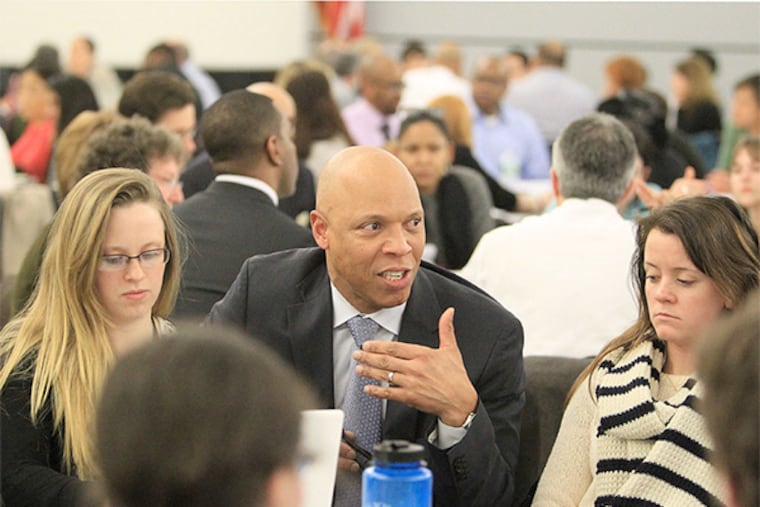SRC gets an earful over universal enrollment
For more than a year, a working group has been exploring sweeping changes to the way students apply and are assigned to city schools - a universal enrollment process that would boil Philadelphia School District, charter, and possibly private schools' application and assignment systems into one.

For more than a year, a working group has been exploring sweeping changes to the way students apply and are assigned to city schools - a universal enrollment process that would boil Philadelphia School District, charter, and possibly private schools' application and assignment systems into one.
On Monday night, a few hundred parents, students, and others gathered to give the School Reform Commission an earful on the idea. Many said they saw serious problems with universal enrollment, which could be managed by a third party and, some fear, might narrow families' choices.
Superintendent William R. Hite Jr. said he understood the concerns. He emphasized that the district was not overseeing the universal enrollment efforts, and said its opting in was not a given.
"There's still a lot of unanswered questions," Hite said.
When the Great Schools Compact, an alliance of district, charter, and archdiocesan schools chaired by Philadelphia's chief education officer, Lori Shorr, was organized in 2011, one of its stated goals was moving the city toward a common application process like those adopted in places including New York City and Denver.
Boosters say the benefits are many. Instead of the current patchwork system, with different deadlines and rules that are often not clear, families would have to complete only one application. There would be no waiting lists and much less uncertainty. Schools could budget more effectively, knowing how many students to expect.
But critics say the current plan is full of holes. While district schools would have to opt in, charter and private schools would not be compelled to. A private third party would run the process, raising questions about who would pay and how privacy would be ensured.
And the proposed move to a single, best-offer system - meaning students would have to rank their choice of schools and would be required to go to the school assigned to them, or else be relegated to a less selective school - has raised perhaps the most concern.
At Monday night's SRC meeting, where no votes were taken, Lisa Haver, a former district teacher, urged the district to dump universal enrollment.
"This seems like an answer in search of a problem," Haver said.
A better approach, she said, is to invest in district schools, struggling this year with a budget situation so dire many schools lack adequate supplies, full-time counselors, and nurses.
Erin McLeary, a parent in the district, said she did not like the idea of a single-best-offer system. And she was not comfortable with the idea of an application that mixes different types of schools.
"I feel like charter, district, and private schools are three separate entities that do not belong together," she said. "They should be kept separately."
On the face of it, universal enrollment could bring equity to an application system that for years has been described as unfair - students whose parents know how to navigate the process get into good schools, and those without strong advocates languish in underperforming neighborhood schools.
But Sophia Saunders, a parent and Home and School Association officer at McCloskey Elementary in East Mount Airy, said many students without strong family support likely would not even fill out an application.
"How do you account for the kids who don't have a responsible parent to enroll them in this universal system?" Saunders asked. "It's not going to be an equitable system."
Others raised concerns about who was planning the universal enrollment process, why the planning had been done in private so far, and whether the district, with its current austerity budget, should be contemplating such a big change and possible new expense. Some said the district and charter schools ought to revamp and streamline their application processes, but without the single, best-offer component.
SRC member Feather O. Houstoun said that she understood some people were happy with the universal enrollment proposal, but that skepticism was understandable.
"As much work as has been done," Houstoun said, "we are really at a very early stage in terms of thinking about what the characteristics of a different kind of enrollment approach might be."
Officials said other public meetings on the topic would be scheduled around the city this year.
215-854-5146 @newskag